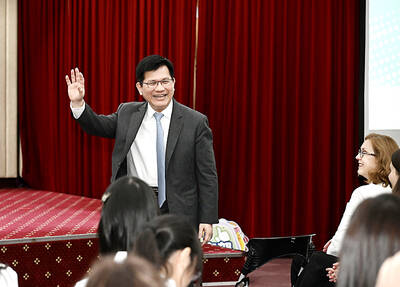China is striving to rein in violent security guards with new rules that will prevent them from beating up people or otherwise abuse their positions, state media said yesterday.
The State Council has published draft rules aiming to impose curbs on the tens of thousands of security guards who protect government offices, schools, factories and businesses across China, Xinhua news agency said.
The new rules come in the wake of an incident last month where government-hired guards in Hubei Province bludgeoned to death a man who had videotaped them while they beating up a group of protesters.
The incident caused a nationwide uproar against security guards and led to an investigation into more than 100 city inspectors in Tianmen City.
The draft rules explicitly forbid security guards from restricting the personal freedom of any individual and searching their persons, the report said. Security guards are banned from "insult, assault, battery or inducing others to commit battery," as well as withholding individual property or identification.
Guards will also no longer be allowed to use violence or threaten to use violence to demand payment, infringe personal privacy or leak secrets, it said.
In Shanghai, meanwhile, human-rights lawyer Zheng Enchong (鄭恩寵) was repeatedly beaten by police officers outside his home in recent days, his wife and associates said.
Zheng, who has lived under house arrest for several months, has sustained serious injuries caused by plainclothes police officers who, in one attack, knocked him down, then repeatedly hoisted his body parallel to the ground and dropped him on the concrete, people who have visited him said.
In a telephone interview, Jiang Meili (
"A guy stopped him and pushed him to the ground," Jiang said. "One man held him by the neck, while another kneed him in the stomach. Then five or six men carried him back upstairs, beating him in the elevator, too."
Shanghai police officials declined to comment.
Jiang said that the beatings represented a sharp escalation of a recent campaign by the Shanghai authorities to quiet her husband.
Associates of the lawyer who have spoken with him said the beatings started after he began advising residents who have organized a campaign against a high-tech railroad project that would cut through middle-class neighborhoods in the city.

FIREPOWER: On top of the torpedoes, the military would procure Kestrel II anti-tank weapons systems to replace aging license-produced M72 LAW launchers Taiwan is to receive US-made Mark 48 torpedoes and training simulators over the next three years, following delays that hampered the navy’s operational readiness, the Ministry of National Defense’s latest budget proposal showed. The navy next year would acquire four training simulator systems for the torpedoes and take receipt of 14 torpedoes in 2027 and 10 torpedoes in 2028, the ministry said in its budget for the next fiscal year. The torpedoes would almost certainly be utilized in the navy’s two upgraded Chien Lung-class submarines and the indigenously developed Hai Kun, should the attack sub successfully reach operational status. US President Donald Trump

Taiwan Semiconductor Manufacturing Co (TSMC, 台積電) is expected to start construction of its 1.4-nanometer chip manufacturing facilities at the Central Taiwan Science Park (CTSP, 中部科學園區) as early as October, the Chinese-language Liberty Times (the Taipei Times’ sister newspaper) reported yesterday, citing the park administration. TSMC acquired land for the second phase of the park’s expansion in Taichung in June. Large cement, construction and facility engineering companies in central Taiwan have reportedly been receiving bids for TSMC-related projects, the report said. Supply-chain firms estimated that the business opportunities for engineering, equipment and materials supply, and back-end packaging and testing could reach as high as

ALL QUIET: The Philippine foreign secretary told senators she would not respond to questions about whether Lin Chia-lung was in the country The Ministry of Foreign Affairs on Wednesday confirmed that a business delegation is visiting the Philippines, but declined to say whether Minister of Foreign Affairs Lin Chia-lung (林佳龍) is part of the group, as Philippine lawmakers raised questions over Lin’s reported visit. The group is being led by Deputy Minister of Agriculture Huang Chao-chin (黃昭欽), Chinese International Economic Cooperation Association (CIECA) chairman Joseph Lyu (呂桔誠) and US-Taiwan Business Council (USTBC) vice president Lotta Danielsson, the ministry said in a statement. However, sources speaking on condition of anonymity said that Lin is leading the delegation of 70 people. Filinvest New Clark City Innovation Park

DEFENSIVE EDGE: The liaison officer would work with Taiwan on drones and military applications for other civilian-developed technologies, a source said A Pentagon unit tasked with facilitating the US military’s adoption of new technology is soon to deploy officials to dozens of friendly nations, including Taiwan, the Financial Times reported yesterday. The US Department of Defense’s Defense Innovation Unit (DIU) is to send a representative to collaborate with Taiwan on drones and military applications from the semiconductor industry by the end of the year, the British daily reported, citing three sources familiar with the matter. “Drones will certainly be a focus, but they will also be looking at connecting to the broader civilian and dual-use ecosystem, including the tech sector,” one source was